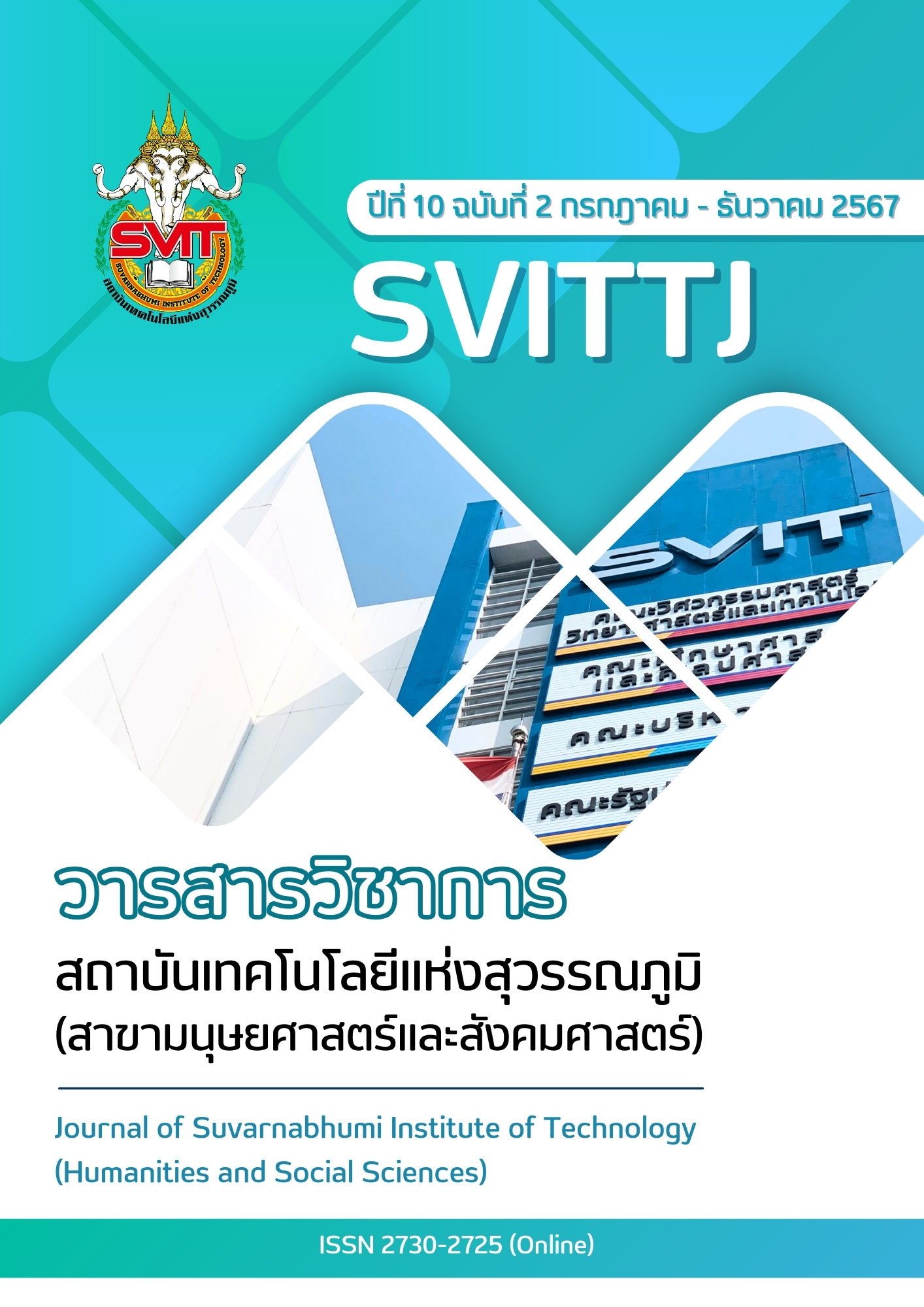THE LIFE DEVELOPMENT SKILLS MANAGEMENT FOR LIVING A NORMAL AND HAPPY LIFE OF INDIVIDUALS IN THE 21ST CENTURY
Keywords:
Life Skill Development, Living a Normal Happy Life, The 21st CenturyAbstract
The purpose of this academic article is to present guidelines and activities in developing people life skills of all genders, all ages and all career fields in the 21st century, it was found that the guidelines for developing life skills so that individuals have the potential to lead normal and happy lives amid social fluctuations in the 21st century are: 1) must be developed with activities that focus on working together individuals so that people can have a process of thinking together participate in and be proud of the group's work, which will lead to self-esteem. 2) Must develop activities that focus on developing thinking processes and solving complex problems that require higher-order thinking skills, such as activities, solve social or community problems, social development and creativity activities to promote happiness in society, etc. and 3) must be developed with activities that emphasize the use of digital technology to participate in activities such as activities to study information from learning resources in the form of information in the online system, computational activities using ready-made computer programs and activities that focus on presentations using various types of modern technology, etc.
References
ณฐวัฒน์ ล่องทอง. (2565). การปรับตัวให้เข้ากับการเปลี่ยนแปลงในศตวรรษที่ 21 เพื่อความสุขในการทำงาน. เชียงใหม่: คณะมนุษยศาสตร์ มหาวิทยาลัยเชียงใหม่.
นภัทร สิทธาโนมัย. (2566). 21st Century Skills ทักษะแห่งศตวรรษที่ 21. สืบค้นจาก https://smart-icamp.com/2021/07/06/21st-century-skills.
นำโชค อุ่นเวียง. (2566). โลกในศตวรรษที่ 21. สืบค้นจาก https://www.trueplookpanya.com/learning/detail/34764.
ธีร์ ทิพกฤต และคณะ. (2555). 6 คำถามสร้างทักษะชีวิต: ประสบการณ์สำหรับครูทุกกลุ่มสาระการเรียนรู้. กรุงเทพฯ: จูนลาย มอร์นิ่ง
ประเสริฐ ตันสกุล และคณะ. (2558). ยุทธศาสตร์ทักษะชีวิตเพื่อพัฒนาบุคลิกภาพเยาวชน. กรุงเทพฯ : สำนักงานคณะกรรมการป้องกันและปราบปรามยาเสพติดแห่งชาติ.
พระณัฐวุฒิ พันทะลี. (2563). การเปลี่ยนแปลงทางสังคมในศตวรรษที่ 21. วารสารวิชาการพระพุทธศาสนาเขตลุ่มแม่น้ำโขง. 3(1, กรกฎาคม-ธันวาคม 2563)
พัทฐรินทร์ โลหา. (2562). ศตวรรษที่ 21. สืบค้นจาก https://www.gotoknow.org/posts/659944.
ไพรินทร์ สระแก้ว. (2565). ทักษะชีวิตและสังคม. กรุงเทพฯ: อักษรเจริญทัศน์.
ยืน ภู่วรรณ. (2567). ทักษะแห่งศตวรรษที่ 21. สืบค้นจาก https://cubiccreative.org/21st-century-skill/.
ยุุตติชน บุุญเพศ. (2566). รููปแบบการส่งเสริมทักษะชีวิตในโรงเรียนประถมศึกษาของพื้นที่่ เขตพัฒนาพิเศษภาคตะวันออก. วารสารบัณฑิตวิทยาลัย มหาวิทยาลัยราชภัฏสวนดุสิต, 19(2, พฤษภาคม – สิงหาคม 2566).
โรงเรียนนานาชาติบางนา. (2565). การเรียนรู้ Life Skills “ทักษะชีวิต” สำคัญ และจำเป็นสำหรับลูกของเรา.สืบค้นจาก https://www.dprep.ac.th/th/life-skills-framework/
วลัยลักษณ์ คงพระจันทร์. (2565). ทักษะแห่งศตวรรษที่ 21: อยู่รอดแม้จุดยืนมนุษย์สั่นคลอน ในโลกดิจิทัลที่ไม่ย้อนกลับหลัง. สืบค้นจาก https://www.nectec.or.th/news/news-pr-news/21st-centuryskills.html.
สุวิธิดา จรุงเกียรติกุล. (2561). ทักษะการเรียนรู้ในศตวรรษที่ 21(The Twenty-First Century Skills). สืบค้นจาก https://www.trueplookpanya.com/education/content/66054/-teaartedu-teaart-teaarttea-
โสภา ก๊กบางยางและคณะ. (2565). ทักษะชีวิตร่วมสมัย. กรุงเทพฯ: สำนักวิชาศึกษาทั่วไป มหาวิทยาลัยเกษมบัณฑิต.
สำนักงานคณะกรรมการการศึกษาขั้นพื้นฐาน. (2559). แนวทางการพัฒนาทักษะชีวิต. กรุงเทพฯ: สำนักงานพระพุทธศาสนาแห่งชาติิ.
Botvin, Gilbert J. (2006). Life Skills Training: Promoting Health and Personal Development. New York: Princeton Health Press.
World Economic Forum. (2023). The World Economic Forum’s Future of Jobs 2023. Retrieved from https://www.wearecp.com/world-economic-forum-2023/.
World Health Organization. (1994). Life Skill Education in School. Geneva: World Health Organization.
Downloads
Published
Issue
Section
License
Copyright (c) 2024 Suvarnabhumi Institute of Technology

This work is licensed under a Creative Commons Attribution-NonCommercial-NoDerivatives 4.0 International License.
บทความที่ได้รับการตีพิมพ์เป็นลิขสิทธิ์ของวารสาร Sarasas Journal of Humanities and Social Science ข้อความที่ปรากฏในบทความแต่ละเรื่องในวารสารวิชาการเล่มนี้เป็นความคิดเห็นส่วนตัวของผู้เขียนแต่ละท่านไม่เกี่ยวข้องกับสถาบันสารสาสน์เทคโนโลยีแห่งสุวรรณภูมิแต่อย่างใด ความรับผิดชอบองค์ประกอบทั้งหมดของบทความแต่ละเรื่องเป็นของผู้เขียนแต่ละท่าน หากมีความผิดพลาดใดๆ ผู้เขียนแต่ละท่านจะรับผิดชอบบทความของตนเองแต่ผู้เดียว



